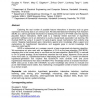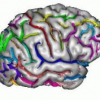98 search results - page 3 / 20 » Learning Relational Features with Backward Random Walks |
142
click to vote
CVPR
2012
IEEE
13 years 3 months ago
2012
IEEE
Mode-seeking has been widely used as a powerful data analysis technique for clustering and filtering in a metric feature space. We introduce a versatile and efficient modeseekin...
130
click to vote
IDA
2006
Springer
15 years 1 months ago
2006
Springer
Exploring the vast number of possible feature interactions in domains such as gene expression microarray data is an onerous task. We describe Backward-Chaining Rule Induction (BCR...
106
click to vote
ICPR
2002
IEEE
16 years 2 months ago
2002
IEEE
This paper introduces an approach for handling complex labelling problems driven by local constraints. The purpose is illustrated by two applications: detection of the road networ...
126
click to vote
Publication
State-of-the-art techniques for probability sampling of users of online social networks (OSNs) are based on random walks on a single social relation. While powerful, these methods ...
ICML
2010
IEEE
15 years 2 months ago
2010
IEEE
Markov logic networks (MLNs) use firstorder formulas to define features of Markov networks. Current MLN structure learners can only learn short clauses (4-5 literals) due to extre...


